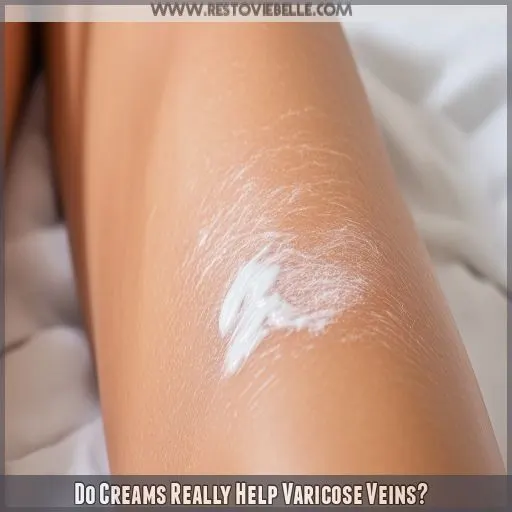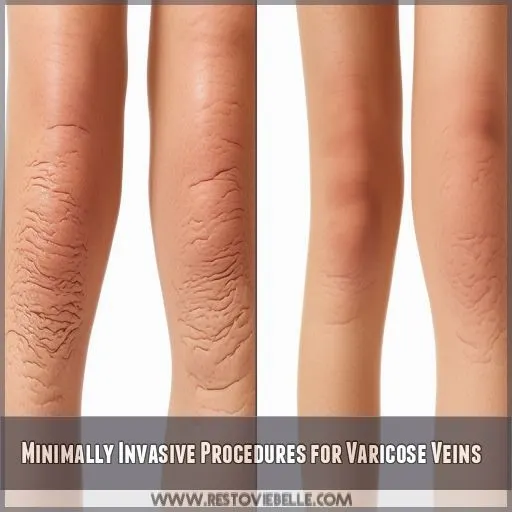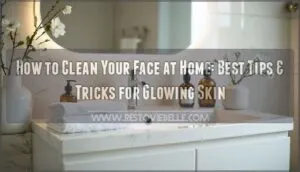This site is supported by our readers. We may earn a commission, at no cost to you, if you purchase through links.
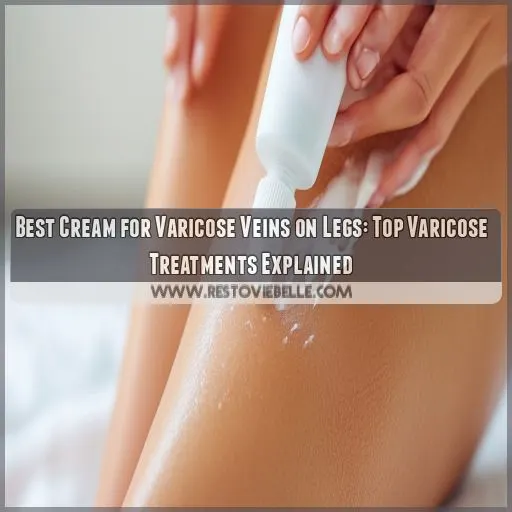
In this in-depth guide about vein health, learn how to take control with the best ingredients proven to work, plus minimally invasive procedures, to attain a smooth, youthful-looking leg.
Table Of Contents
- Key Takeaways
- Top 3 Creams for Varicose Veins on Legs
- Do Creams Really Help Varicose Veins?
- Minimally Invasive Procedures for Varicose Veins
- Frequently Asked Questions (FAQs)
- What is the best cream for varicose veins?
- Do creams really help varicose veins?
- What is the best over the counter treatment for varicose veins?
- What can I rub on my legs for varicose veins?
- What are the causes of varicose veins?
- Can varicose veins lead to serious complications?
- How can a healthy diet help with varicose veins?
- Are varicose veins hereditary?
- What is the role of exercise in managing varicose veins?
- Conclusion
Key Takeaways
- Varicose veins are unsightly and uncomfortable. They can caused by weakened veins, damaged valves, genetic factors, hormonal changes, aging, obesity, and prolonged standing or sitting.
- Topical creams can provide temporary relief from symptoms of varicose veins, but they cannot address the underlying cause. For more effective treatment, consider professional recommendations such as sclerotherapy, laser therapy, radiofrequency ablation, or compression stockings.
- Minimally invasive procedures like radiofrequency ablation, mechanochemical ablation, and cyanoacrylate glue offer effective solutions for varicose veins. These procedures target the root cause of the issue and provide longer-lasting results compared to topical creams.
- A healthy diet and regular exercise can help prevent and alleviate symptoms of varicose veins. Maintain a healthy weight, eat plenty of fruits and vegetables, and get regular exercise to keep your veins healthy.
Top 3 Creams for Varicose Veins on Legs
Let’s explore the top three creams for varicose veins on your legs. These include Pharmapulse Varicose Spider Veins Cream, SalColl Collagen Body Gel, and Diosmin 1000mg Varicose Vein Complex.
1. Pharmapulse Varicose Spider Veins Cream
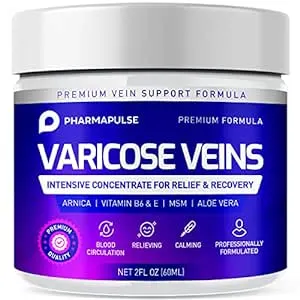
Pharmapulse Varicose Spider Veins Cream promises to soothe and nourish your skin, reducing the appearance of unsightly veins. While it may provide temporary relief, this cream can’t address the root cause of your varicose veins. Its natural ingredients like amino acids may temporarily improve skin tone, but won’t permanently eliminate the underlying vein issues.
If you’re looking for a lasting solution, you’ll need to explore more effective treatments like sclerotherapy or laser therapy. Don’t waste your money on creams that can’t truly fix the problem.
Best For: Those seeking temporary relief from the discomfort and appearance of varicose veins.
- Soothes and moisturizes skin
- Contains amino acids that may improve skin tone
- Fast-acting and cooling
- Strong smell
- Does not address the root cause of varicose veins
- Expensive and no returns allowed
2. SalColl Collagen Body Gel
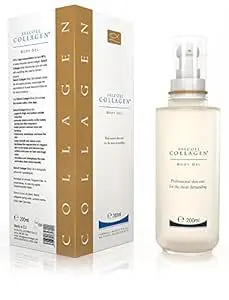
SalColl Collagen Body Gel is designed to nourish and tighten your skin while reducing the appearance of varicose veins and spider veins.
This 100% natural marine collagen formula penetrates deeply to hydrate your skin, helping to repair scar tissue and improve skin elasticity.
It’s cruelty-free and preservative-free, making it suitable for all skin types, including sensitive skin.
Although it won’t treat underlying vein issues, it offers temporary relief from discomfort and enhances your skin’s overall appearance.
Best For: Those looking to improve skin elasticity, reduce the appearance of cellulite and varicose veins, and repair scar tissue.
- 100% natural marine collagen formula
- Cruelty-free and preservative-free
- Suitable for all skin types
- Does not treat underlying vein issues
- May not be suitable for those with severe skin conditions
- Results may vary depending on individual skin type
3. Diosmin 1000mg Varicose Vein Complex
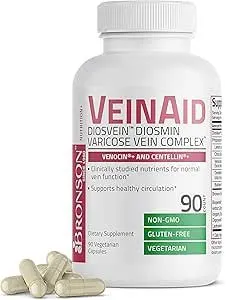
Diosmin 1000mg Varicose Vein Complex is a scientifically researched blend of 100% natural ingredients supporting healthy blood circulation. It contains Diosmin, Venocin, and Centellin. Such is one which includes bioflavonoids from citrus; the added BioAccelerators ensure the formula’s safety and effectiveness without GMOs or gluten.
It provides 90 citrus-flavored capsules manufactured in a fully registered cGMP facility. While not a cream, the evidence-based formula will still be handy in solving one of the causal factors – blood circulation – to alleviate symptoms of varicose veins.
For comprehensive varicose vein care, consider using it in combination with other treatments.
Best For: Individuals seeking natural support for healthy blood circulation and varicose vein symptoms.
- Clinically researched ingredients
- 100% natural and free of GMOs and gluten
- Convenient and easy-to-take capsule form
- Not a topical cream
- May not be suitable for all individuals with varicose veins
- Results may vary
Do Creams Really Help Varicose Veins?
Topical creams can provide temporary relief for varicose veins by reducing symptoms like swelling and discomfort. However, they’re not able to address the underlying valve issues that cause varicose veins, and professional treatments are often necessary for long-term solutions.
Effectiveness of Topical Creams
Creams can be effective in providing temporary relief from symptoms of varicose veins. They help hydrate and firm the skin, reduce inflammation, and improve cosmetic appearance. However, even the best cream for varicose veins on legs can’t address the underlying valve issues.
Limitations of Topical Creams
While topical creams may temporarily mask the appearance of varicose and spider veins, they can’t address the underlying causes. These creams are often ineffective, costly, and may even carry potential side effects. Explore more effective alternatives for lasting relief.
Professional Recommendations
Topical creams provide only temporary relief for varicose veins symptoms and don’t treat the underlying issue. Professional recommendations for managing varicose veins include:
- Sclerotherapy: Effective for collapsing veins.
- Laser therapy: Useful for closing veins.
- Radiofrequency ablation: Seals off veins.
- Compression stockings: Improve circulation.
Minimally Invasive Procedures for Varicose Veins
When dealing with varicose veins, minimally invasive procedures like Radio Frequency Ablation, Mechanochemical Ablation, and Cyanoacrylate Glue offer effective solutions. They target the root cause of the issue, providing longer-lasting results compared to topical creams.
Radio Frequency Ablation
Radio Frequency Ablation uses targeted heat generation to collapse the vein walls, effectively treating varicose veins. This minimally invasive procedure boasts high treatment efficacy and faster recovery times compared to traditional varicose vein surgery. Patients can expect long-term positive outcomes with this radio wave-based approach.
Mechanochemical Ablation
mechanochemical ablation collapses the varicose veins by combining both chemical and mechanical techniques in a minimally invasive yet efficient way. With a catheter, direct action is inflicted on the vein walls. This procedure is performed under the assurance of precision with duplex ultrasound. The technique is very safe and effective, hence decent support for patients.
Cyanoacrylate Glue
Cyanoacrylate glue offers a minimally invasive treatment for varicose veins. By sealing off the affected vein, it effectively redirects blood flow, reducing symptoms. This method eliminates the need for compression stockings after treatment and provides quick recovery with minimal discomfort, promoting better vein management.
Frequently Asked Questions (FAQs)
What is the best cream for varicose veins?
Varicose vein creams with ingredients like Vitamin K, butcher’s broom, and horse chestnut may provide temporary symptom relief and improve cosmetic appearance but don’t treat the underlying cause. Consult a doctor for effective treatment options.
Do creams really help varicose veins?
Creams may temporarily mask the appearance of varicose veins, but they can’t treat the underlying cause. To truly banish those bulging veins, you’ll need professional medical intervention – the kind that delivers lasting relief.
What is the best over the counter treatment for varicose veins?
Compression stockings provide the best over-the-counter relief for varicose veins, enhancing blood flow, reducing swelling, and alleviating discomfort. These stockings apply pressure, supporting vein function and can be conveniently used alongside other treatments.
What can I rub on my legs for varicose veins?
Though creams for varicose veins won’t treat the actual cause of the problem, they may still alleviate it to some degree. Massaging those touted with vitamin K, horse chestnut, or butcher’s broom temporarily reduces swelling and looks much better.
What are the causes of varicose veins?
Varicose veins are caused by weakened veins, damaged valves, genetic factors, hormonal changes, aging, obesity, and prolonged standing or sitting. These factors hinder blood flow back to the heart, leading to enlarged, twisted veins.
Can varicose veins lead to serious complications?
Yes, these conditions involve severe complications of varicose veins: ulcers to the limbs, bleeding, and deep vein thrombosis. These require immediate medical attention to prevent further aggravation of health problems and help in effective treatment.
How can a healthy diet help with varicose veins?
A healthy diet aids varicose veins by maintaining a healthy weight, reducing pressure on veins, promoting blood circulation, and providing nutrients like Omega-3, coenzyme Q10, and fiber, which support overall vein health and reduce inflammation.
Are varicose veins hereditary?
Yes, varicose veins can be hereditary. If your parents or grandparents had them, you’re more likely to develop them too. But lifestyle factors like obesity and pregnancy also increase your risk.
What is the role of exercise in managing varicose veins?
Exercise strengthens your leg muscles, improving blood flow and reducing pressure on veins. Regular activity can prevent new varicose veins and alleviate symptoms of existing ones. Aim for walking, swimming, or cycling to keep veins healthy.
Conclusion
Ultimately, the best cream for varicose veins on legs depends on your individual needs and preferences.
While topical creams can provide some relief, more effective treatments like radio frequency ablation or cyanoacrylate glue may be necessary for significant improvement.
Consult a healthcare professional to determine the most suitable approach for your varicose vein condition and achieve the smooth, youthful-looking legs you desire.

